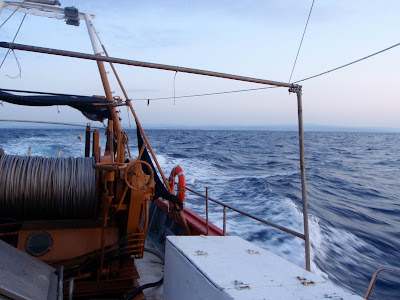 Last September I did a day’s work aboard a Mediterranean trawler. Evidently there was no comparison to be made with the experience described by Redmond O’Hanlon in his book Trawler. The work was easy, the sun shone, the crew were good-natured and friendly. It was a day trip in flip-flops with fantastic food and plenty of wine, coffee, and brandy. But I hadn’t gone to make comparisons.
Last September I did a day’s work aboard a Mediterranean trawler. Evidently there was no comparison to be made with the experience described by Redmond O’Hanlon in his book Trawler. The work was easy, the sun shone, the crew were good-natured and friendly. It was a day trip in flip-flops with fantastic food and plenty of wine, coffee, and brandy. But I hadn’t gone to make comparisons.At the time my near miss with a fishing boat, in the blackest hours of the night while sailing Onawind Blue to Ibiza, was still fresh in my mind. I wanted to gaze down from the bridge of a similar craft as it steamed at 8 knots through the dark. I wanted to try and judge how visible OB would have been and I also wanted to see what sort of lookout was maintained.
I rapidly concluded that a small boat sailor on the sea at night absolutely cannot rely on being seen by commercial fishing vessels. Unless, of course, a small boat sailor happens to be on said vessel. From the bridge of the fishing boat I couldn’t help but scan the sea as if every wave might hide a madman in a rowboat.

As the sun swept the night over the western horizon I left these considerations aside and got on with enjoying the day. We set the net and I helped prepare breakfast in the galley. (Well, I chopped a clove of garlic, covered the table with sheets of newspaper and laid out five spoons and five dented tin cups.) Breakfast was fried spotted flounder (citharus linguatula), dumbo octopus (grimpoteuthis) in a white wine reduction and fried monkfish (lophius piscatorius) liver accompanied with Catalan tomato bread, salad and wine. The cook plonked the frying pans on the table. The skipper poured the wine.
We spooned octopus straight into our mouths, took up the flounder with our fingers, broke the flesh away from the bone and stacked it on the tomato bread. We ate the liver like it was pâté and gulped the wine.
After clearing the feast away (one of the crew simply bundled up all the newspaper and scraps and threw them overboard), I sat on the bow in the sun and watched the water.
Over breakfast I’d been hard pushed to persuade the fishermen that, in sailing a small boat to Ibiza, I hadn’t passed the bounds of reckless lunacy. I’d explained about responsible preparation, equipment, training and waiting for favourable weather but although they nodded and grunted through mouthfuls of flounder I knew they weren’t convinced.
Sitting on the bow I felt very secure, but paradoxically the sea seemed bigger, and the waves steeper than they would have done from down in Onawind Blue. It would seem counter intuitive but being slightly more distant from the sea made it seem more imposing. For someone used to seeing the sea from this perspective the step down into OB might well be a big one. I wondered if the fishermen would view my voyage any differently if I took them (one by one, of course) for a sail in my boat. And knew they wouldn’t.
At mid-morning we turned around and trawled back the way we had come. I followed the manoeuvre then looked over the stern into our wake. To port and starboard the rest of the trawler fleet were also turning. Our speed was three knots. Deep down the trawl doors were slowly churning up the muddy sea floor, leaving great ruts in their wake. I imagined the cloud of disturbed mud, the lower lip of the net ploughing up the sea floor, the mouth of the net hungrily swallowing anything in it’s path. Everyday each boat was scraping clean 24 miles of sea floor. I turned away from the disaster going on below. Surely this too was madness.

3 comments:
Ben, congratulations on turning your attention to commercial fishing during your 'off season' with Onawind, and I always appreciate your attention to good food! I've been ruminating over the fishing question and sustainability etc, and will have some work in the future concerning this topic, but I applaud your going out and experiencing. The food made my mouth water!
"the disaster going on below"
Benthic trawling is just the same as using a bulldozer to farm sheep. Works really well... once.
The surface of the ocean hides the ills man does below. Can you imagine any farmer dragging a plow and net to catch his animals for market, destroying the very thing that provides for his survival.
Madness indeed.
Thomas, I look forward to seeing posts on commercial fishing over at 70.8. I've just been re-reading The Perfect Storm, while I wait for a Speck on the Sea to arrive, which has whetted my appetite for stories of the Grand Banks cod fishery and the longliner sword fishery. And then the salmon and crab fisheries on the Alaskan coast are steeped in history too.
Dale, bottom trawling has other negative effects too. Apparently that cloud of mud that rises behind the net can travel for miles and even prevent light from penetrating the pelagic zones. it's pretty grim which ever way you look at it.
Post a Comment